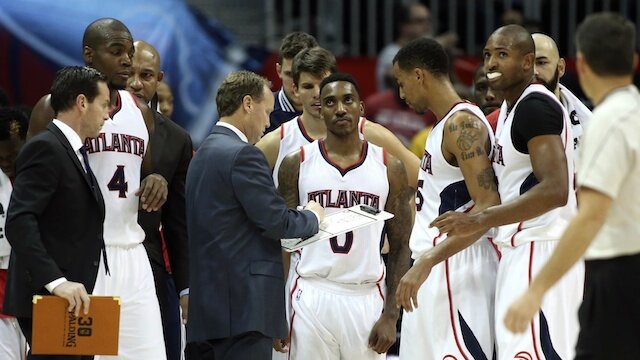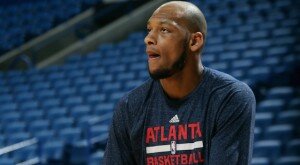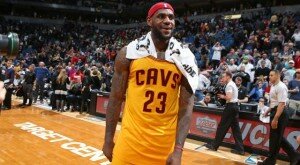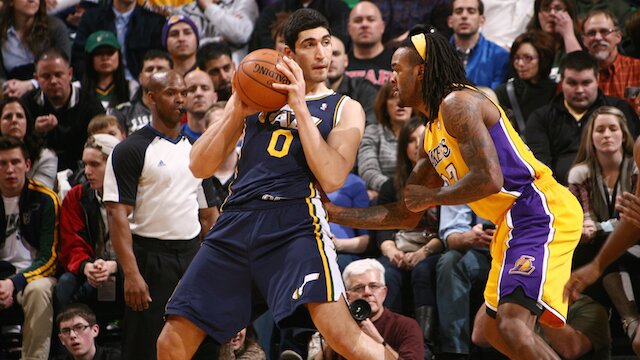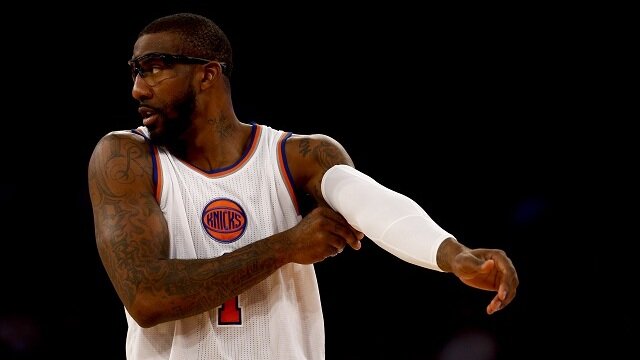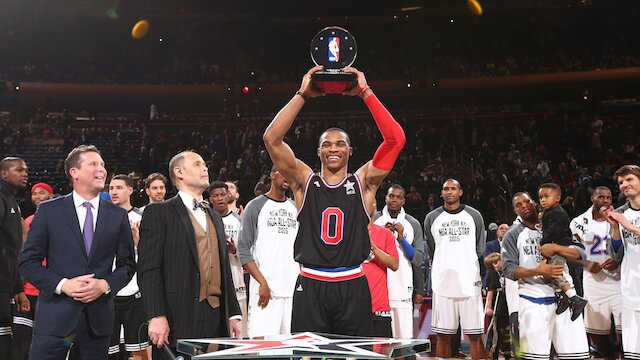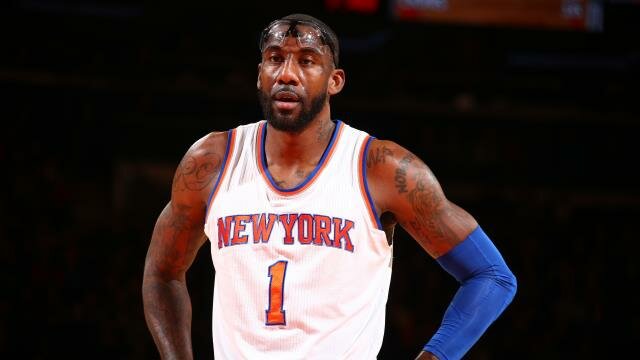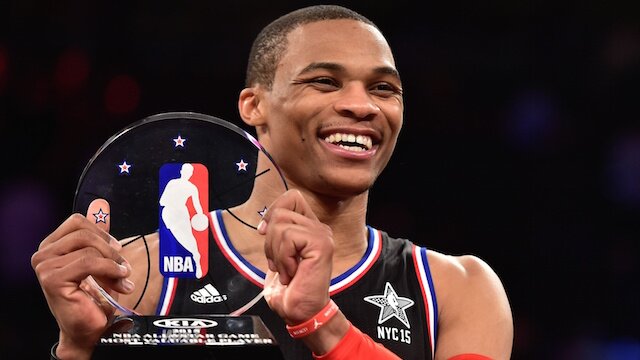What Makes The Atlanta Hawks So Good?
On December 26, 2013, the Atlanta Hawks were 16-13, entering a game against the Cleveland Cavaliers. They were in third place overall in the Eastern Conference, and appeared to be rolling, when Al Horford went down with a season-ending pectoral injury.
The Hawks were never able to fully recover from the loss of their unheralded big man, and although they still managed to qualify for the playoffs — thank you Eastern Conference — their struggles were painfully apparent at times, especially on the road. From January through April, the Hawks suffered an eight-game losing streak, and two six-game losing streaks respectively, ultimately going 24-31 without Horford’s services.
They then pushed the top-seeded Indiana Pacers to seven games, before being eliminated, and forced to turn their attention to what needed to be done to transform them into a legitimate contender.
But, a funny thing happened over the summer, a thing that I believe is solely responsible for them now being seated at the top of the Eastern Conference, and playing arguably the best basketball in the NBA…
That’s right. The Hawks made virtually no noise in the offseason. They didn’t attempt to woo any of the top-flight free agents. They made a solid, yet unspectacular pick in the draft in Adreian Payne. They brought in Thabo Sefolosha and Kent Bazemore in an attempt to bolster their defense and scoring on the wings, but other than those unassuming moves, they stood pat. And that’s exactly what they needed to do.
There’s a little thing called continuity that is becoming an afterthought in terms of how teams are now constructing their rosters. Player development is being deemphasized in favor of player acquisition. Team chemistry is becoming more of an underrated factor in today’s NBA, and in my opinion is just as important as the massive acquisition of otherworldly talent. Just ask the Cavaliers.
The Hawks believed in their roster, and even amidst the turmoil and scandals involving their ownership group, they apparently managed to strengthen the culture and resolve of this team by bringing back their core entirely intact. Add on top of that a solid coaching staff, high IQ players, and impressive systems on both sides of the ball, and they have found themselves a recipe for success. But, just how good can this team be? Let’s take a closer look.
What Makes Them Good?
I have already touched on their success in the abstract, but let’s now take a more in-depth look at what makes this team so good.
First and foremost, the Hawks run one of the best, and most enjoyable, offenses in the league. Mike Budenholzer spent 17 seasons as an assistant coach of the San Antonio Spurs. During that time, he was a key part of four NBA championship teams, and under Gregg Popovich‘s tutelage, he became intimately familiar with the intricacies of the motion offense.
The Hawks are third in the NBA in total assists behind the Golden State Warriors and the Boston Celtics, a number that will inevitably go down with the departure of Rajon Rondo. They lead the league in assist to field goal ratio, meaning that more of their points come off of assists than any other team. They also lead the league in assists per possession (0.262), which amounts to 26% of their possessions ending with assists that lead to points. These are all indicators of the unrivaled ball-movement that their offense employs so effectively.
In fact, their ball movement is so crisp and effective that not a single player on that team has a usage rate that is more than 25.3%, and that player is their primary ball-handler Jeff Teague. Dennis Schroder has a usage rate of 24.1%, Paul Millsap 23.7%, Mike Scott 23%, and Al Horford 22%. This even distribution of possessions “used” by certain players is also indicative of an offense that relies heavily on good ball movement.
Not only do they share the ball better than any other team, they are also an incredibly effective shooting team. Their true shooting percentage ranks fourth overall. They don’t take a lot of shots, currently 26th in field goals attempted per game, but as evidenced by their field goal percentages, they make the most of the shots they do take.
It is no fluke that they are being labeled as the Spurs East. They are very similar in team makeup, and offensive execution.
But, they are not only good on the offensive side of the ball. They are currently sixth in the league in defensive rating at 103.0. They are third in scoring defense, holding teams to 97.2 points per game. They are sixth in shooting defense, holding opponents to 43.8% shooting. They control the pace of games, play a physical brand of defense, and force their opponents out of their comfort zones. And they do all of that without fouling. They are second in the league in fewest fouls per game.
How Far Can They Go?
If you asked me before the season started, I would have told you that the Hawks would be good enough to get a third or fourth seed in the East, but would probably make a second-round exit in the playoffs at best.
Having seen this team play in more depth now, I believe that they have all the pieces to make a run at the Eastern Conference Finals.
They have a point guard in Teague that is able to play the “Tony Parker” role, distributing the ball and scoring when needed. Kyle Korver is having a season for the ages, and while I keep waiting for him to come back down to earth, he has yet to show any signs of regression. He is currently shooting 50% from the field, 52% from three-point distance, and has an effective field goal percentage of 68%, second to only DeAndre Jordan.
Millsap is their blue-collar workhorse, and does all the little things that nobody else wants to do. He is arguably their most valuable player. And Horford, after a slow start, is finally rounding into form. If he can be even 75% of what he once was, he gives them enough of a presence in the paint to disrupt opponents’ offenses and protect the rim.
If there is one place to criticize the Hawks, it would be their bench play. They currently rank 18th in bench scoring. 23rd in bench rebounding, and their bench players play fewer minutes than all but six teams in the league.
Shelvin Mack has been unspectacular, Bazemore has been one of the more disappointing free agent signings, and Payne has yet to grasp the NBA game. If the Hawks could find a way to secure an extra rotation player, preferably a big man that can help them on the offensive boards — they are currently second to last in this category — I would be much more confident in their ability to sustain a playoff run.
Even without any additional moves, their solid coaching, spectacular offense, stout defense and team chemistry may be enough for them to get past any team in the East save the Chicago Bulls, who I think may be a tough matchup for them.
They may not have the name recognition of the Cavaliers or the flashy play of the Washington Wizards. They may not have the trendy following of the Toronto Raptors, or the franchise history of the Bulls. But, what they do have is something a lot of teams would be wise to begin emulating in earnest. They may have found the blueprint to building a team capable of competing in a less than attractive market.
I, for one, am now a believer.
Court Zierk is a Columnist for www.RantSports.com. Follow him on Twitter @CourtZierk, “Like” him on Facebook or add him on Google.
Lakers Must Pursue Enes Kanter
Looking for a big man, the Los Angeles Lakers should inquire about frustrated Utah Jazz center Enes Kanter. Read More
Knicks Wise to Let Go of Stoudemire, Begin Rebuild
Why the New York Knicks made the right decisiont to let Amar'e Stoudemire go and start the rebuilding process. Read More
10 NBA All-Star Weekend Talking Points
Catching up on the big plays, winners and newsmakers during the 2015 NBA All-Star weekend in New York. Read More
Russell Westbrook Proves Himself in All-Star Game
Russell Westbrook proved his critics wrong in a tremendous outing at the NBA All-Star game. Read More
5 Potential Landing Spots for Amar'e Stoudemire
Which team will sign Amar'e Stoudemire after the New York Knicks bought out the remainder of his contract on Sunday? Read More
5 NBA Players Not Living Up To New Contract
After an NBA summer of seismic shifting, now would be an appropriate time to evaluate the past offseason's signings. This list reveals five players who are struggling most under their new contracts. Read More
15 Greatest NBA All-Star Game Performances Ever
Russell Westbrook put on a show with 41 points on way to being named the 2015 NBA All-Star Game MVP, but where does his performance rank all time in the game's history? Read More
Zach LaVine As Good As Advertised In Dunk Contest
The NBA Dunk Contest lives up to its hype thanks to teenager Zach LaVine. Read More
Miami Heat Shouldn't Sign Jameer Nelson
The Miami Heat are in desperate need of a quality point guard, but Jameer Nelson just doesn't fit the bill. Read More
5 Last-Minute Trades for the Golden State Warriors
Taking a look at the Golden State Warriors and five trades they might want to consider before the 2015 NBA deadline. Read More
The Best Slams in NBA All-Star Slam Dunk Contest
Did you miss the 2015 NBA All-Star Weekend Slam Dunk Contest? Well, then catch video of the top five dunks right here. You'll be shocked by what you see. Read More
LeBron Continues to Dodge All-Star Dunk Contest
Why does LeBron James continue to dodge the NBA All-Star Game despite being in the prime years of his career? Read More
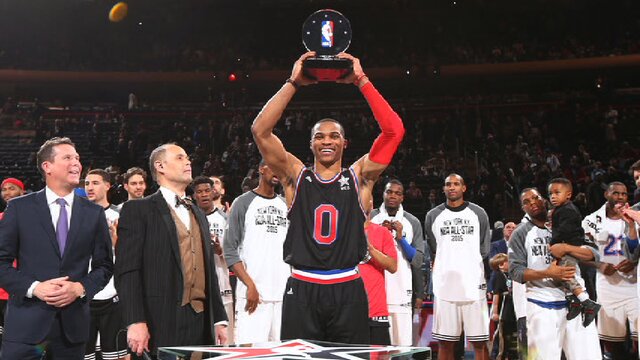
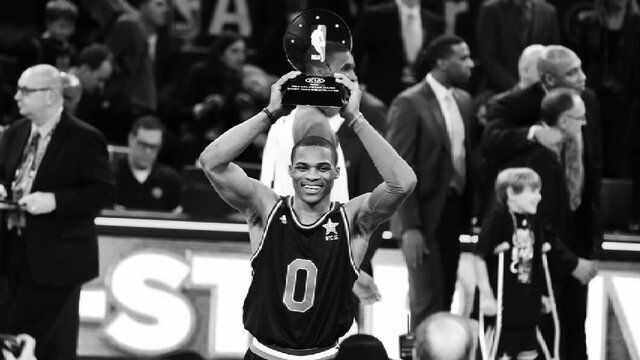
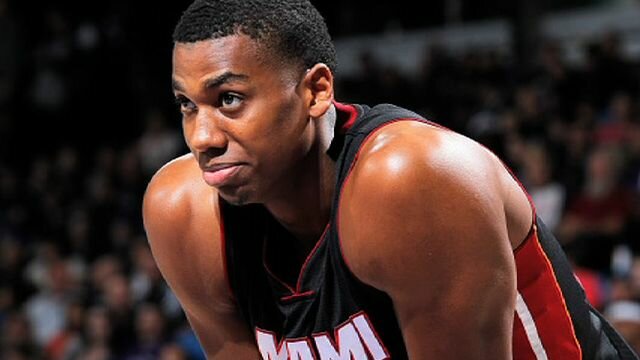
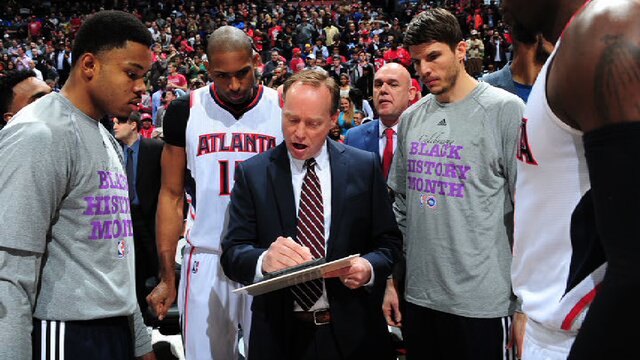

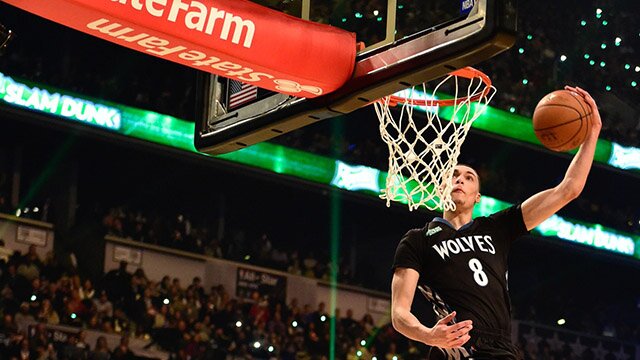
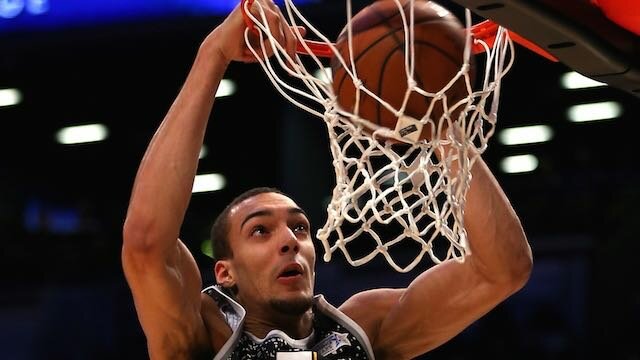

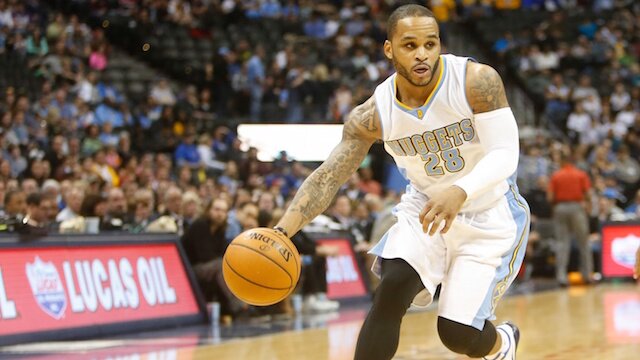
 @courtzierk
@courtzierk 